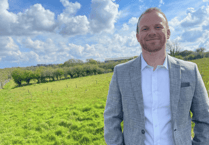IN his latest fortnightly column for the Cornish Times, former BBC Spotlight presenter Justin Leigh looks at the role of journalists in challenging our politicians to establish the facts.
THE last couple of years have certainly tested the calibre of our politicians.
It’s no exaggeration to suggest that they’ve had to weigh up life and death decisions to deal with COVID and protect the NHS.
Everyone will have their own view on how well our political leaders have risen to that challenge.
At some stage in the future there will be an inquiry into how this crisis has been handled.
In the meantime we have to rely on journalists to question the life-changing decisions being made on our behalf by our elected representatives.
Again, everyone will have their own view on how well they have done.
Politics and journalism go hand in hand and can be as divisive as each other.
For all those who support a particular political party, there will be just as many who loathe them. The same goes for journalists!
Over the years the tension between politics and journalism has often been explosive.
Big-name interviewers such as John Humphrys, Jeremy Paxman, Andrew Neil and Andrew Marr regularly clashed with the political leaders of the day.
It sometimes created dramatic moments of radio of television. But more often than not it simply left the audience feeling frustrated.
A politician not answering the question and an interviewer constantly interrupting the politician usually provided very little useful information for those watching or listening. At this point I need to hold up my hands and admit that I was guilty of this from time to time when I presented Spotlight. Interviewing a politician was rarely a satisfactory experience and I would often go home afterwards kicking myself for not asking a particular question or letting the interviewee get away with avoiding a question.
It’s an inexact science. As an interviewer I tried to research the subject as much as possible and think carefully about the answers the audience needed.
But all that preparation would go out of the window when we got on air.
We often had limited time for the interview and if the interviewee tried to avoid the question we would have to waste precious time asking the question again.
It would result in growing frustration on my part with my voice getting louder.
This would then leave the audience feeling I had shouted at the politician and was therefore biased one way or another.
There were a few occasions when persistence paid off.
During a robust exchange with Boris Johnson I secured assurance from him that the South West Water rebate would continue through this Parliament.
I’m not sure he quite knew what he’d agreed to, so keep an eye on that over the next couple of years.
And there was a memorable encounter with the former Environment Secretary Owen Paterson when, in answer to my question, he said: “the badgers have moved the goal posts”. A phrase that haunted him until his political career came to a controversial end last year.
But, as I pointed out earlier, the art of the political interview is almost impossible to master.
It requires both sides to engage honestly and fairly, but in most cases the politician will be on the defensive and the interviewer on the attack. Perhaps, though, this is changing.
The big beasts of political broadcasting that I mentioned previously have all moved on.
In addition Adam Bolton at Sky News has also recently stepped down, Jon Snow has just left Channel 4 News and Piers Morgan is no longer chargrilling politicians for breakfast on ITV.
I detect a shift away from those angry clashes between journalists and ministers.
I hope that means that more interviews will shine a light on the topic rather than descend into a chaotic shouting match.
But I also fear that politicians may get an easier time, just when they need to be held to account more than ever.
Increasingly our MPs and other decision makers are able to bypass the forensic questioning of a journalist and reach their audiences unfiltered via social media.
It’s a great way for them to communicate directly with the electorate and if it’s used to pass on useful information about policy or to clarify a position that’s great.
But if it means they can avoid detailed scrutiny that’s not so good.
Most of the local MPs I have encountered over the years have willingly engaged with me as an interviewer and have accepted that from time to time I would ask awkward questions and give them a hard time.
One or two complained occasionally, but they generally accepted that I was there to hold them to account on behalf of the wider public.
They also knew they had to appear on local TV and radio to show their constituents they were working. But now more and more of them reach out to voters on social media and therefore don’t feel the need to be subjected to a rigorous television interview.
Ultimately voters can hold the politicians to account at the ballot box, but there are long gaps between elections, so we still need some regular way to keep them on their toes.
I hope our local MPs will continue engaging with the local media, and that journalists keep asking the questions.
And don’t forget social media is a two-way thing, so we can all use it to challenge our politicians and debate with them – as long as it’s constructive!
Bye for now.




Comments
This article has no comments yet. Be the first to leave a comment.